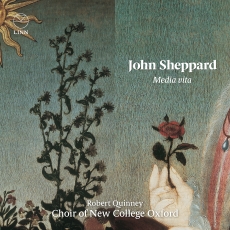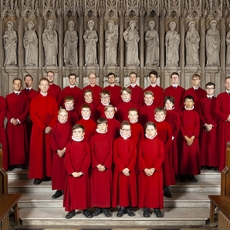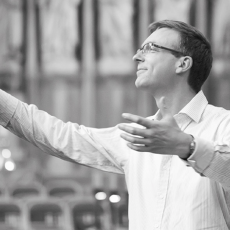Choir of New College Oxford & Robert Quinney - Sheppard: Media vita - Fanfare [JFW]
The focal work on this program is the final track, Sheppard's six-voice setting of the responsory Media vita, built upon a chant that has been famous from the Middle Ages to the present for its powerful invocation of the Lord's intercession. This setting is important enough for David Allen, a contributor to the New York Times, to have devoted a Sunday story to it, spread across the classical page of the Sunday Arts section last January 3. He called Sheppard's setting "a cult favorite of early music" and drew a parallel between the pandemic of 1550s England (influenza in 1557 and 1558, the composer succumbing to the second wave) and the Covid pandemic that had brought death to nearly two million people worldwide as he was writing. He discussed the nine recordings (imagine, discography in the Sunday Times!), focusing on David Skinner's 2012 recording just released as a download. That version was stripped of much of the repetition that "made the piece so alluring" (as Allen writes). Robert Quinney, however, presents the work here complete, though at 24:23 he does not reach the 30 minutes that Martin Baker admitted in that article to be "daringly slow." In my review of Baker's version (41:2), I summed up the seven existing recordings of the work, choosing Baker's superlative choir of men and boys over my previous choice of the adult mixed ensemble Stile antico (33:5), which was barely slower than Quinney at 25:32. Harry Christophers, David Allinson, and Owen Rees all match Quinney's timing, occupying a middle ground, with Peter Phillips and Paul McCreesh being faster (Skinner is much shorter due to the cuts). Quinney has the only other choir of men and boys in this work, and he includes among his seven selections four first recordings, two set to psalm texts. Another psalm on the program, Deus misereatur, is almost as unfamiliar, recorded (perhaps for the first time) by the Ensemble Jachet de Mantoue but not reviewed here. Sacris solemniis, one of the hymns for Corpus Christi, was recorded most recently by Harry Christophers on the same disc as his Media vita. The opening alternatim hymn, A solis ortus cardine, and Confitebor tibi, a text from Isaiah 12, are the other premiere recordings. Those three psalms make this disc indispensable for anyone who regards John Sheppard as a leading composer of the Tudor period. They are psalms 85 (86), 42 (43), and 66 (67). The last is framed by a chant antiphon used at the foot-washing on Maundy Thursday, which is in the same mode 6. The antiphon was used for that ceremony in the Middle Ages and in the Sarum use, though not in the modern Roman liturgy. (The notes refer incorrectly to the foot-washing at Mass on Maundy Thursday; until 1970 it was done later in the day.) The text of Confitebor tibi is noted as a "variant version of Vulgate." Indeed, it varies considerably from the familiar text, for as the notes point out, "the text, from Isaiah, has been altered from a personal cry to a corporate petition." This was circumstantial evidence for dating it to the first year of the reign of Mary I and the return (temporarily, it turned out) to union with Rome. The motets on psalms and Isaiah are not based on cantus firmi, as the other three pieces are. Heard as the climax of the Sheppard program, the power of Media vita is undeniable. It is one of the fine recordings of this work. If I still have a slight preference for Baker's daringly slow version, it is due to the sound of the boys at the top of the staff, a bit smoother, less edgy than Quinney's boys. Comparing Quinney's version of the final piece to Martin Baker's reminds us of the connection of these two to James O'Donnell, who raised the choirs of Westminster Cathedral and Westminster Abbey to such heights. Baker was organist under O'Donnell at the cathedral and succeeded him on his departure for the abbey. Quinney then became assistant master of music under Baker and later organist at the abbey under O'Donnell until he left for a brief stint at Peterborough Cathedral before succeeding Edward Higginbottom's 38 years at New College. Quinney's new disc was preceded by several CDs for another label; of these, I praised Like as the hart as "a well-constructed program" (41:3). This disc is a marvelous evocation of the Tudor era.


